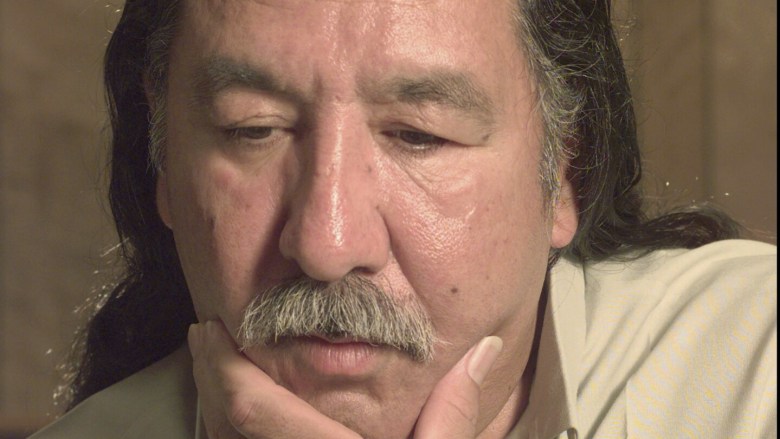In his final hours as president, Joe Biden pardoned Marcus Garvey and commuted Indigenous activist Leonard Peltier’s life sentence to house arrest.
Black and Indigenous activists celebrate these wins, highlighting Biden’s promise to promote racial equity. However, both Garvey’s pardon and Peltier’s clemency still underscore inequities in the U.S. justice and Presidential pardon systems.
Community reactions to Peltier’s freedom: a mixture of surprise, relief and desire for more
Tim Maxville is a member of the Choctaw Nation and an activist for the American Indian Movement. Monday morning, he was surprised to learn that Leonard Peltier was free. Over the years, Maxville has marched at rallies and protested to free Peltier.
“Even just three years ago, we were at a protest in Tulsa, Oklahoma, at the federal courthouse and got attacked by the Tulsa police,” he said. “I didn’t think it would happen as it got later last night.”
Peltier was imprisoned for nearly five decades and is the longest-incarcerated political prisoner in U.S. history. His sentence commutation to house arrest allows him to return to his reservation. Still, it does not exonerate him of the charges that have befallen him despite being challenged for decades.

In 1977, Peltier was convicted for the deaths of two FBI agents who died during a shoot-out on the Pine Ridge Indian Reservation. He spent more than half his life in prison under a case even his attorney Kevin Sharp told The Associated Press the evidence against him had been falsified.
For Gen Hadley, a Comanche Nation citizen and AIM activist, Peltier’s freedom brings shock, relief, sadness, and joy. “His imprisonment has served as a painful reminder of the systemic injustices faced by Indigenous people,” she said. “As we celebrate Martin Luther King Jr. Day, we also celebrate Indigenous resilience, the enduring power of collective action, and community solidarity.”
On Monday night, Principal Chief of the Cherokee Nation, Chuck Hoskin Jr., shared similar sentiments: “This historic decision reflects a critical step toward reconciliation, not only for Mr. Peltier but for Native communities that have long fought for recognition, sovereign rights, and dignity.”
The decision brought long-overdue relief to Peltier’s family and supporters, who see his release as a victory. For Maxville, who spent years at rallies and protests nationwide, it’s not enough to send him back home. “There are still many more injustices we need to stand up and fight for even though we no longer have to scream ‘Free Leonard Peltier,” Maxville said. “Him getting to go home is wonderful, of course, but he still needs to be proven innocent.”
The connection with Marcus Garvey’s pardon
Biden granted a posthumous pardon to Garvey 85 years after his death. Considered the founder of the first significant Black nationalist movement in the United States, Garvey is to Black American activists as Peltier is to the American Indian Movement, a prominent figure in the fight for justice.
Convicted of mail fraud in 1923, in what is widely regarded a racially motivated trial, Garvey served two years of a five-year sentence before President Calvin Coolidge commuted his sentence in 1927. However, his freedom came at a price: deportation to Jamaica.
Garvey’s son, Julius Garvey, hoped Biden’s posthumous pardon would restore his father’s legacy and fully exonerate him.
Howard University professor Justin Hansford worked with Garvey’s son for 15 years to receive this presidential pardon with an acknowledgment that Marcus Garvey was unjustly charged.
Indigenous activists don’t want to see Peltier posthumously exonerated in a system that has a history of pardoning wealthy and White petitioners over BIPOC ones.
Garvey’s trial and conviction for mail fraud were widely seen as racially motivated, while allegations of falsified evidence and judicial misconduct marked Peltier’s decades-long imprisonment. The parallels between their struggles underscore the importance of addressing systemic flaws not only in granting clemency but in creating a justice system that operates equitably for all.
Related Stories:
- Family of Marcus Garvey seeks posthumous pardon
- Imprisoned Leonard Peltier seeks presidential clemency after Covid battle
Call for continued advocacy and reform
The clemency actions of Marcus Garvey and Leonard Peltier are significant milestones in addressing historical injustices. For Black and Indigenous communities, these decisions validate decades of activism and advocacy, restoring a measure of dignity to two figures who symbolize the fight against systemic oppression.
Yet, they also expose the persistent inequities in the U.S. justice system and the limitations of presidential pardons.
Garvey’s posthumous pardon reaffirms his role as a foundational leader of Black nationalism and Pan-Africanism. Still, it arrives nearly a century after his conviction—a delay that highlights the slow pace of justice for marginalized communities.
Similarly, while Peltier’s commutation brings a long-awaited sense of relief, his freedom is incomplete, constrained by house arrest, and overshadowed by the unresolved questions surrounding his conviction.


